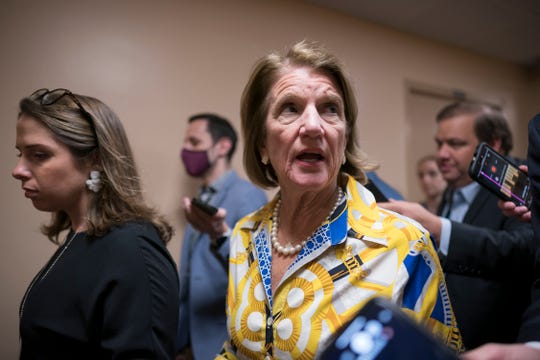What you should know about W. Va. Sens. Manchin and Capito

In an unexpected turn of events, major decisions in the U.S. Senate now hinge on the Democrat and the Republican representing the state of West Virginia.
West Virginia, which will be down to only two congressional seats after its next redistricting, isn’t typically as powerful in Congress as larger, more populous counterparts such as California, New York and Texas.
But in a Senate evenly divided along party lines, Sens. Joe Manchin, a moderate Democrat, and Republican Shelley Moore Capito are positioned to swing key parts of President Joe Biden’s legislative agenda.
The makeup of the Senate hasn’t been this close since the end of former President George W. Bush’s final term.
In the event of a tied vote, Democrats can push legislation through the Senate via a process known as budget reconciliation, which would allow Vice President Kamala Harris to serve as a tiebreaker. However, the Senate must first reach a tie, meaning Manchin would need to vote in line with his party. Reconciliation also comes with constraints, which means Democrats can only use it sparingly.
That need to ensure all 50 Democratic votes for a bill makes Manchin’s vote pivotal for the passage of a $15 federal minimum wage, corporate tax increases and voting rights.
Capito is the top Republican negotiator on Biden’s infrastructure plan, which the president pushed in his first address to a joint session of Congress in April. She has not budged on allowing a reversal to the 2017 tax cuts introduced during former President Donald Trump’s term in office. On Thursday, Biden offered to keep the tax cuts intact.
Here’s what you should know about the senators:
Who is Joe Manchin?
Manchin, who has represented West Virginia in the Senate for over 10 years, has occasionally sided against his party on progressive issues, such as eliminating the filibuster and passing the For the People Act, the Democrat’s voting reform package.
“Some in my party have argued that now is the time to discard such bipartisan voting reforms and embrace election reforms and policies solely supported by one party. Respectfully, I do not agree,” Manchin wrote in a June 6 opinion piece published online by West Virginia paper, the Charleston Gazette Mail.
Since 2011, Manchin claims, no Senate Democrat has split with his party more often. He was the only Democrat to oppose a bipartisan proposal to provide zero funding for border security during the Trump administration and voted to open the Arctic National Wildlife Refuge for drilling.
The senator’s middle-of-the road politics have frustrated his progressive Democratic colleagues. Manchin held up the passage of Biden’s landmark $1.9 billion pandemic relief package because of his refusal to raise a weekly federal unemployment bonus from $300 to $400. Manchin eventually agreed to extending the $300 benefit for five months with a tax relief benefit.
He also voted against raising the federal minimum wage to $15 and resisted Biden’s climate change proposals to cut fossil fuel emissions and end coal and oil subsidies, earning him censure from Sen. Bernie Sanders, I-VT, among others.
Jemele Hill, a contributing writer for The Atlantic, called Manchin “power hungry” and accused him of upholding white supremacy in a tweet Sunday for not supporting an overhaul of U.S. voting rights and election law.
And in response to Manchin’s op-ed, Rep. Mondaire Jones, D-NY, tweeted Sunday that it “might as well be titled, ‘Why I’ll vote to preserve Jim Crow.’”
But Manchin has supported major Democratic objectives. He voted against repeated efforts by Senate Republicans to repeal the Affordable Care Act without a viable replacement. Manchin also opposed Trump’s 2017 tax overhaul .
A former businessman, Manchin grew up in Farmington, a small coal mining town in West Virginia. He began his political career as a state legislator, then as governor of West Virginia from 2005-2010.
Manchin was elected in a special election to fill a vacant seat after the late Sen. Robert C. Byrd died in 2010. He was reelected to a full term in 2012. The senator currently chairs the Senate Energy and Natural Resources Committee and serves on the Senate Committee on Appropriations, the Senate Committee on Armed Services, and the Senate Committee on Veterans’ Affairs.
Who is Shelley Moore Capito?
Capito was elected to Congress in 2000. In 2014, she became the first woman to represent West Virginia in the U.S. Senate and was elected with the largest margin of victory for a Republican in the state’s history. She was reelected in 2020.
Capito has previously supported legislation for transportation and infrastructure. Along with Sen. Cory Booker, D-NJ, she introduced the Innovative Water Workforce Development Act in 2018. The act established a grant program to help develop workers in the water utilities sector.
The Republican Party tapped Capito to lead negotiations of the infrastructure component of Biden’s $2 trillion infrastructure and jobs package.
In a March editorial published by USA TODAY, Capito called for ”fiscally responsible,” bipartisan legislation to update and improve the country’s roads and bridges.
Sen. Shelley Moore Capito, R-W.Va., the GOP's lead negotiator on a counteroffer to President Joe Biden's infrastructure plan, walks with reporters as senators go to the chamber for votes on May 27. (Photo: J. Scott Applewhite, AP)
“Federal investment along with investment from state and local governments and the private sector is essential to meet our current and future transportation needs,” she wrote. “A multi-year surface transportation reauthorization bill will provide certainty to states, giving them the confidence to make investment decisions and carry out projects that address these needs. We need to be fiscally responsible and thoughtful with spending levels, and avoid partisan lightning rods.”
Capito currently serves on the Senate Commerce, Science, & Transportation, Appropriations and Rules and Administration committees.
Source: Read Full Article

